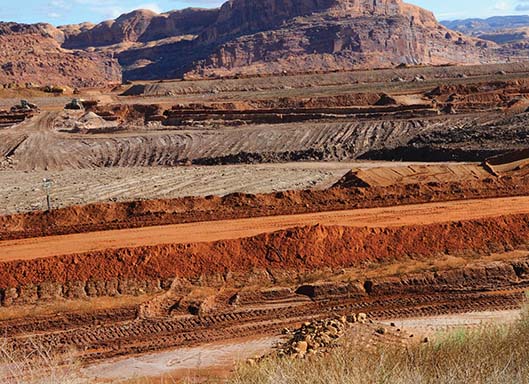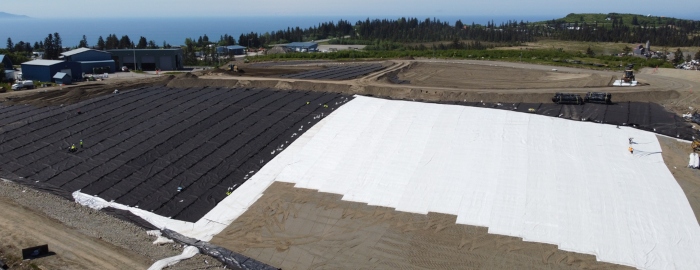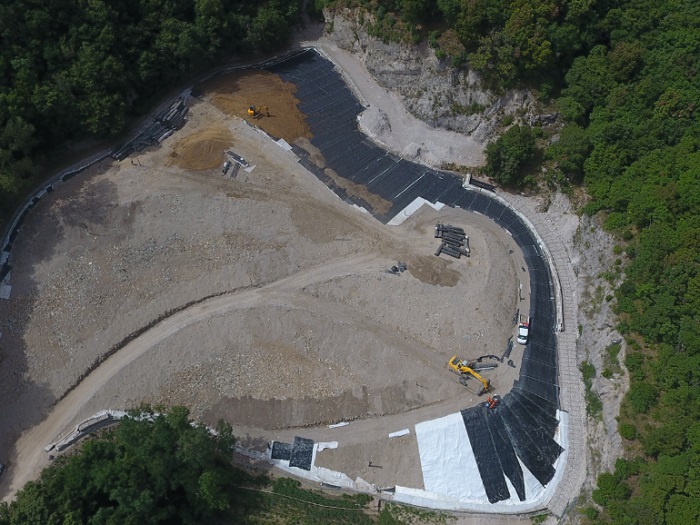GCL used to cap former arsenic processing plant
October 12th, 2023
The New South Wales, Australian government has completed a $3.4 million project to remediate contamination at the former Jennings Processing Plant near Tenterfield, cleaning up a legacy polluted site almost 100 years since it closed. It took years of planning to excavate and contain soil contaminated at the former Jennings Processing Plant. The Crown Lands […]
GCL and geosynthetic membrane installation for mining site
April 1st, 2023
Nestled in the Midas Trench lineament on the northwest side of the Humboldt Range, numerous mines take full advantage of their proximity to the basin and ridge frontal faults that serve as conduits for gold-bearing hydrothermal fluids. In 2020, CETCO was contacted by a mine in this region to assist with its heap leach pad […]
Transitioning from 30 MIL PVC geomembrane to 60 MIL HDPE
February 1st, 2023
Q:I have a client that operates a Subtitle C landfill that utilizes a double-liner system of 30 mil (0.76mm) PVC geomembrane for the base liner. They are wanting to evaluate the possibility to transition from 30 mil (0.76 mm) PVC to 60 mil (1.52 mm) high-density polyethylene (HDPE) geomembrane for the base liner system. In […]
Geosynthetic clay liner with aquiclude
August 1st, 2022
Q: We are trying to design and construct an aquiclude with a geosynthetic clay liner (GCL). Do you have any experience with this application where a GCL has been used as the impervious barrier between a flowing stream and the underlain geologic formation? A: I have not heard of a GCL being used alone in […]
Stacking GCL rolls
June 1st, 2022
Q: I have a question regarding the storage and handling of geosynthetic clay liner (GCL) rolls. The manufacturer allows stacking up to five GCL rolls. Is this okay? A: The answer depends on the subgrade under the stacked GCL rolls and the equipment you are using to handle the rolls. In a manufacturing plant, with […]
GCL-GM geocomposite: Which end is up?
April 1st, 2022
Q: In a geosynthetic clay liner-geomembrane (GCL-GM) geocomposite, does it make any difference which side of the geocomposite is up: GM or clay? A: This is a very detailed question that is application specific. The following design details all need to be considered: Is the GCL-GM geocomposite used for a liner or a cover, is […]
Impregnation of GCLs
April 1st, 2022
Q: We are confused with the term “impregnation” as it relates to seaming geosynthetic clay liners (GCLs). There are two types of impregnations: (1) Edge impregnation, and (2) complete nonwoven (cap layer) impregnation of GCLs. How does a manufacturer do this? A: The edge impregnation of GCLs (1) is done in the field by an […]
Geosynthetics for Alaska landfill closure
February 23rd, 2022
Solmax provides a combination of geosynthetics for Alaska landfill closure project with multiple geotechnical challenges. Installation of geosynthetics at the Homer Solid Waste Facility landfill in Alaska. Photograph courtesy of Solmax Kenai Peninsula Borough in southern Alaska needed to complete phase two of a landfill-closure project at its Homer (Alaska) Solid Waste Facility. This involved […]
Landfill geosynthetics for abandoned Italian dump
February 7th, 2022
Landfill geosynthetics transform the abandoned dump near Cava De’Tirreni, Italy, into a green oasis in the heart of the Metelliana Valley. Installing landfill geosynthetics at the dump near Cava De’Tirreni, Italy. Photograph courtesy of Officine Maccaferri S.p.A. In 2018, a significant environmental recovery and securing plan began for the former municipal landfill for Cava de’ Tirreni, Italy, […]
Sewn versus welded seams
February 1st, 2022
Q: On your GMA Techline website list of sample questions and answers, a question is asked about a recommendation for sewn versus welded seams for geotextiles. Bob Koerner answered this question by stating that you have done a study for joining geosynthetic clay liner (GCL) overlap seams via eight methods. Can you share that study […]
 TEXTILES.ORG
TEXTILES.ORG





